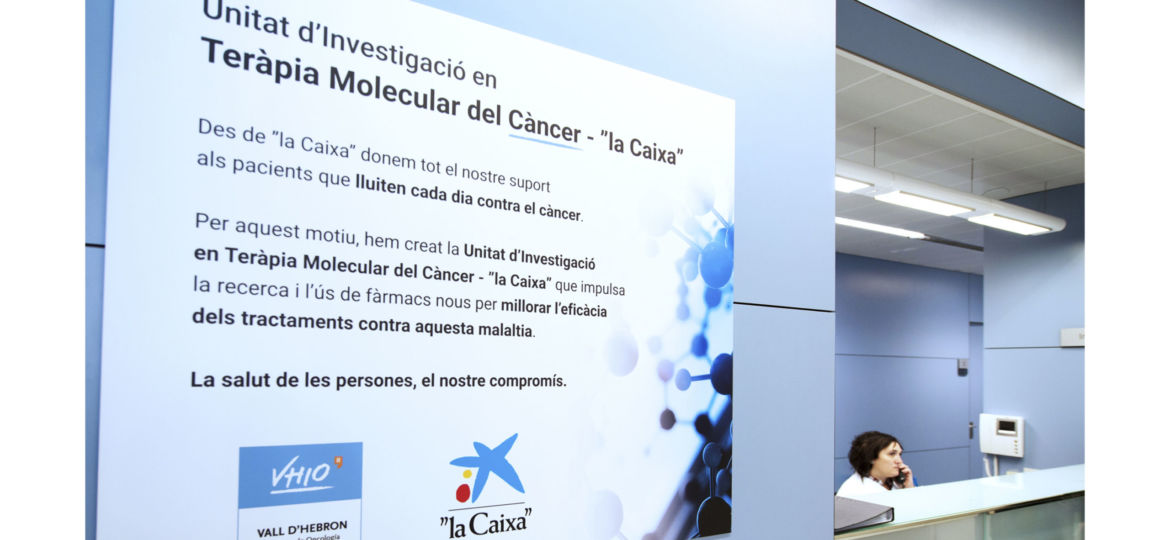
- It has done so within the framework of the last congress of the European Society for Medical Oncology (ESMO).
Barcelona, September 18, 2020.– In recent years, one of the great advances in cancer treatment has been immunotherapy. Thanks to this new approach, in which the patient’s own immune system is used to fight the tumour, the survival outcomes of different types of cancer are improving. However, there are still various challenges to overcome. The Vall d’Hebron Institute of Oncology (VHIO), through its Molecular Cancer Therapy Research Unit (UITM) – “la Caixa”, a European benchmark with a 10-year history of success behind it, has just presented different works related to immunotherapy at the latest congress of the European Society for Medical Oncology (ESMO). This line of research, driven on thanks to the support of the BBVA Foundation, is already present in 60% of the clinical trials that are being carried out at the VHIO.
Efficacy of new treatments in patients previously exposed to immune checkpoint inhibitors.
Advances in recent years have allowed immunotherapy to form part of the therapeutic arsenal for the treatment of multiple solid neoplasms. “Despite the positive effects achieved by immune checkpoint inhibitors, one of the challenges that remains to be resolved is finding biomarkers predictive of response,” explains Dr Alberto Hernando Calvo, a researcher from the UITM – “la Caixa” at the VHIO and first author of a study that aims to evaluate whether the benefits obtained with immune checkpoint inhibitors condition the subsequent efficacy of experimental immunotherapies.
“In clinical practice, the efficacy of previous immunotherapy treatments is taken into account when evaluating new lines with experimental immunotherapy. There are also clinical trials that consider patients’ best response to previous immunotherapies as a selection criterion. This is partly due to the lack of biomarkers that help us in making decisions”, adds Dr Hernando Calvo.
As such, the outcomes of the patients who participated in clinical trials with immunotherapy drugs in the phase I unit at the VHIO between 2016 and 2019 were reviewed. Of the 568 patients who took part in these trials, 101 who had previously received immune checkpoint inhibitor treatments were specifically selected. “Our results suggest that we should take other prognostic and predictive factors into account when evaluating phase 1 immuno-oncology clinical trials, since no association was observed between the efficacy of experimental immunotherapy drugs and the results obtained in previous lines of treatment with immune checkpoint inhibitors”, explains Dr Hernando Calvo. Due to its retrospective nature, the project serves as a hypothesis generator. In addition, it is the starting point for a subsequent analysis led by Dr Augusto Valdivia, current resident at the Vall d’Hebron University Hospital, in which the risk of the appearance of immune-mediated adverse effects in this population will be analysed.
The challenge of cold tumours
Immunotherapy still has its limitations. There is a subgroup of histologies called “cold tumours”, where the tumour microenvironment does not contribute to these treatments working.
“Our group wanted to evaluate the benefit of using combinations of treatments based on antiPD1/PDL1 in a population diagnosed with “cold tumours” in an advanced stage, who have not received immunotherapy previously”, explains Omar Saavedra, first author of one of the studies that has been presented at the ESMO 2020 Congress. To carry out the analysis, 70 patients who received this treatment strategy between 2015 and 2019 within VHIO clinical trials were followed.
“We have observed, in this group of patients, that the combination of treatments based on antiPD1/PDL1 has limited activity”. We still need to select our population to be treated better and to create a strategy for the joint development of drugs and biological biomarkers that can increase the chances of response”, adds Omar Saavedra.
A decade of experience in the treatment of primary CNS tumours
The last of the UITM-“la Caixa” studies that was presented at the ESMO congress analysed the work carried out during the last ten years in the unit for the treatment of patients with primary central nervous system (CNS) tumours. “This is a population that is under-represented in phase 1 clinical trials and we wanted to describe the characteristics and outcomes of this cohort, taking advantage of our experience and thus also developing tools that can help us optimise the selection of these patients”, explains Nadia Saoudi, first author of the study carried out jointly and under the supervision of Dr María Vieito.
In total, data from 141 patients with central nervous system tumours who participated in phase I trials at the VHIO-UITM “la Caixa” between 2010 and 2019 were analysed; their clinical/pathological characteristics and survival data were analysed. “We have seen that it is generally a young population with good functional status despite being highly pretreated, and that the screening failure rates are similar to those of patients with other types of tumours”, explains Nadia, who points out how the clinical/pathological and laboratory factors can be relevant predictors of the outcomes in this population.
In this retrospective study, researchers also wanted to study whether patients who participated in a clinical trial targeting specific mutations obtained better overall survival and disease progression-free survival. “What we have observed is that there are no significant differences; the patients who participated in clinical trials directed against a specific molecular alteration did not obtain any benefit”, concludes Dania Saoudi.
Although specific data on patients with brain tumours treated with immunotherapy will not be presented at this congress, this is an area in development, in which the UITM has participated in various trials, and in which, despite the fact that brain tumours are considered cold tumours, some patients have indeed benefited from immunotherapy treatment.








